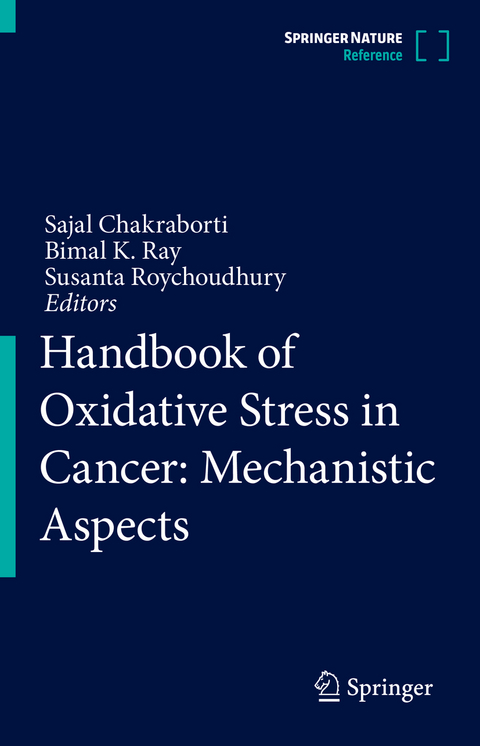
Handbook of Oxidative Stress in Cancer: Mechanistic Aspects
Springer Verlag, Singapore
978-981-15-9410-6 (ISBN)
The book is divided into four broad sections. Each section describes the role of oxidative stress and underlying mechanisms and pathways, at various stages of cancer, including its role in carcinogenesis, cancer progression and metastasis. Further, the book describes how the reactive oxygen species (ROS) modulate gene expression and signal transduction pathways in cancer. The book discusses the ways to interfere with the cancer progression, and design of anti-cancer drugs. The book provides an integrated approach for better understanding of the development phases of oxidative stress-induced cancers, and mainly the current perspectives about mechanistic aspects of cancer initiation, progression and metastasis.
It is a highly resourceful book and would be extremely important to clinicians, students and researchers in the field of cancer genetics, therapeutics and oncology.
Dr. Sajal Chakraborti is a Professor of Biochemistry in the University of Kalyani, West Bengal, India. His research covers the role of oxidant –mediated signalling in the pathogenesis of a variety of diseases. Prof. Chakraborti did is PhD from Calcutta University (1982) and D.Sc from Kalyani University (2004). He did post doctoral research at the Johns Hopkins University, Baltimore; University of Utah Health Sciences Center, Salt Lake City and New York Medical College, New York as a Fulbright Fellow. He received DBT (Govt. of India)-senior overseas research award for his research at the University of Florida, Gainesville (1998-1999). He has been engaged in teaching and research in biochemistry for the past 40 years. He has published over 110 original research papers, 22 book chapters and 15 review articles. He also edited 12 books (Springer). Dr. Bimal K Ray is a Professor of Pathology of the University of Missouri, Columbia, Missouri, USA. He has more than 40 years of teaching and research experience in different universities in USA. One of his research interests is the understanding the basic mechanisms associated with inflammation, the consequence of which is linked to abnormal gene expression that may lead to cancer. Recent findings of Dr. Ray’s laboratory suggest that serum amyloid A-activating factor-1 (SAF-1) activates superoxide dismutase and few other reactive species sensitive antioxidant enzymes in breast cancer and thereby allowing cancer cell proliferation. Dr. Ray published over 100 original research papers and review articles in different international journals of repute. He also published several chapters in books published by reputed publishers. Dr. Susanta Roychoudhury obtained his Ph.D degree from Calcutta University in 1985. He did postdoctoral research at the University of Pennsylvania, USA (1985 to 1990). After that he joined the CSIR-Indian Institute of Chemical Biology, Kolkata, Indiaas a scientist (1991-2015). Subsequently, he was associated with Saroj Gupta Cancer Centre & Research Institute, Kolkata, India as Chief of Basic Research (2015-2021). Currently, he is the ICMR Emeritus Scientist at CSIR-Indian Institute of Chemical Biology, Kolkata, India. As a cancer geneticist, Dr. Roychoudhury made significant contributions on the molecular understanding of the genomic instabilities and functional consequences of gain-of function mutations of TP53 gene in human cancer. He has contributed in the area of cancer stem cells using oral cancer model and developed a microarray-based gene expression signature that distinguishes the aggressive subset of early stage oral cancer from non-aggressive one. He has published over 150 original research articles in several international journals of repute and several review articles and book chapters. Dr. Roychoudhury is the Fellow of all the three Science Academies of India. He has been elected as President of Indian Association for Cancer Research in 2016 and is a recipient of Sir J C Bose National Fellowship by Department of Science and Technology, Govt. of India in 2017.
Involvement of ROS in thyroid cancer.- Skin cancer induced by pollution-medicated ROS.- Roles of β-Glucans in Oxidative Stress and Cancer.- Oxidative stress in glioma and its microenvironment.- Reactive oxygen species and their contribution to carcinogenesis.- Oral cancer and oxidative stress.- Oxidative stress in genitourinary cancer.- Oxidative stress in oral cancer.- Oxidative stress and glyoxalase pathway in cancer.- ROS and EMT in multistep carcinogenesis.- Functional regulation between matrix metalloproteases and cell junction proteins in gastric cancer.- Association of oxidative stress and mitochondrial dysfunction to gynaecological malignancies.- Impact of Caenorhabdits elegans in cancdeer drug resistance and development.- Pharmacology of natural products specifically plant based mitigating cisplatin-induced cardiotoxicity and attenuating oxidative stress, inflammation and associated signalling pathways.- Scafold based selective ROS generation as viable therapeutic strategies.
| Erscheinungsdatum | 11.02.2022 |
|---|---|
| Reihe/Serie | Handbook of Oxidative Stress in Cancer: Mechanistic Aspects |
| Zusatzinfo | 324 Illustrations, color; 64 Illustrations, black and white; LVI, 2675 p. 388 illus., 324 illus. in color. In 3 volumes, not available separately. |
| Verlagsort | Singapore |
| Sprache | englisch |
| Maße | 155 x 235 mm |
| Themenwelt | Medizin / Pharmazie ► Medizinische Fachgebiete ► Onkologie |
| Studium ► 2. Studienabschnitt (Klinik) ► Humangenetik | |
| Naturwissenschaften ► Biologie ► Zellbiologie | |
| ISBN-10 | 981-15-9410-4 / 9811594104 |
| ISBN-13 | 978-981-15-9410-6 / 9789811594106 |
| Zustand | Neuware |
| Informationen gemäß Produktsicherheitsverordnung (GPSR) | |
| Haben Sie eine Frage zum Produkt? |
aus dem Bereich


